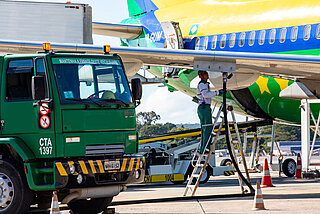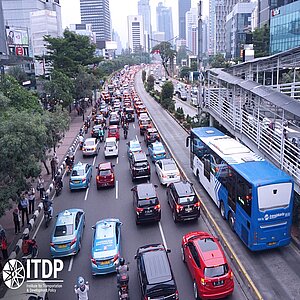Supporting sustainable aviation in Brazil

A German cooperation project promotes the production of sustainable fuels and foresees opportunities in the current global scenario of decarbonizing transportation.
On the road to a low-carbon economy, the aviation sector, which is still far from being fully powered by electricity, has recognised the substitution of kerosene as a business opportunity and launched the “Carbon Offsetting and Reduction Scheme for International Aviation” (CORSIA).
Proposed in 2016 by the International Civil Aviation Organization (ICAO), this sectorial agreement aims to neutralize the growth of CO2 emissions on international flights that adopt sustainable aviation fuels (SAF). According to the agreement, companies that do not meet the targets of SAF use will have to buy credits on the carbon market.
Production of e-fuels in Brazil
Since 2017, IKI´s Climate Neutral Alternative Fuels (ProQR) project in Brazil has been working to make the country an international reference in the production of electric fuels (e-fuels) using the power-to-liquid (PtL) fuel concept, a type of SAF. As an ICAO signatory, Brazil will participate in the mandatory CORSIA phase from 2027.
The project is structured around four areas, namely support for the construction of a pilot project plant, sectorial articulation, training and collaboration with academia, as well as the wide dissemination of project results.
Transition to a clean and decentralised energy supply
Power-to-Liquid fuels use electric energy, produced from renewable sources, such as solar panels, wind turbines and small hydroelectric plants, as primary inputs. The process also involves the production of green hydrogen and the capture of CO2 directly from the ambient air or from industrial sources, such as biogas or glycerin from biodiesel production. The result is a liquid fuel, similar to fossil fuels that allows for an 80% reduction in emissions.
According to Marcos Oliveira Costa, deputy director of IKI´s ProQR project, the possibility of producing these fuels near consumption sites may be considered an innovative change for the sector. "By producing this type of fuel in the same location, or in the vicinity of where it will be consumed, we can better equate the distribution logistics and the high costs involved in supplying airports and airfields in remote regions, such as in Northern Amazonia.”
Having validated the concept, and with technical feasibility studies completed, the IKI project now moves on to another phase. "Today we are at a decisive moment, to consolidate the plans for the project´s pilot plant plant and advancing conversations between partners from Rio Grande do Norte, Ceará, São Paulo and Goiás," said Costa during the ProQR Webinar "Clean Aviation for Brazil" in June. The Project is also working to support the training of reference laboratories to analyse the PtL fuels – an important measure to obtain international certification.
Challenges in the development of sustainable aviation fuels
One of the greatest challenges in the development of SAF is its standardisation. The aim is to ensure that aircrafts have the same performance regardless of the country in which they are refuelled. These complex and costly certification processes require a joint effort between SAF developers, regulatory agencies, laboratories, universities, and aircraft equipment manufacturers. In addition to safeguarding the quality standards of these new fuels, international certification also ensures that adaptations to the aircraft will not be necessary.
High production costs represent another challenge and raise questions regarding the economic viability of sustainable aviation fuels. However, Pietro Mendes, Director of the Department of Biofuels at the Ministry of Mines and Energy (MME) emphasised during the webinar that the energy transition is an irreversible process saying, "Brazil signed onto the mandatory phase of CORSIA, and if airlines that operate international flights cannot be fueled with SAFs here, they will need to buy carbon credits from the international market, which will have an impact on ticket prices anyway."
Eduardo Soriano, Director of the Applied Technologies Department at the MCTI, was even more emphatic, affirming "The most expensive fuel is sometimes the one you do not have. And this is also a matter of national security."
As much as the absence of specific regulations for SAFs in Brazil still represents a barrier for establishing production plants, this may soon change as two resolutions recently published by the National Energy Policy Council (CNPE) present new rules for sector regulation.
Favorable developments in the national political agenda
In May of this year, the launch of the "Fuel of the Future" program represented an important milestone in the decarbonisation of the Brazilian transportation sector, applying to aviation as well. The resolution that institutes the program foresees the introduction of sustainable aviation fuels in the national energy matrix, also anticipating public policies aimed at this sector.
An additional resolution by the National Energy Policy Council was published in February and guides the National Electric Energy Agency and the National Agency for Petroleum, Natural Gas and Biofuels to prioritise research and development investments in new technologies and energy sources. One important source is hydrogen, which has a high energy density, is versatile, emits no CO2 and has the ability to store energy.
The agency also proposed guidelines for the National Hydrogen Program, which will create a regulatory framework for large-scale use. The Minister of Mines and Energy, Bento Albuquerque, announced that a preliminary framework of this strategy is to be set for the beginning of August 2021.
Certainly, the necessary involvement of different sectors, such as science, technology, innovation, transportation, infrastructure and alternative energy, makes the transition to clean aviation more complex in Brazil. However, it also creates possibilities for expanding public funding for such projects. Actions in this direction contribute to creating a safer environment for businesses and for technological innovation, thus enabling the potential development of a low carbon economy.
This is also what the ProQR project is betting on as it continues supporting the construction of the first pilot plant for PtL-SAF in Brazil.
The link has been copied to the clipboard
Contact
IKI Office
Zukunft – Umwelt – Gesellschaft (ZUG) gGmbH
Stresemannstraße 69-71
10963 Berlin



